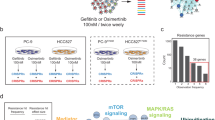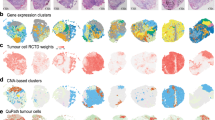Abstract
Loss of transforming growth factor-β receptor III (TβRIII) correlates with loss of transforming growth factor-β (TGF-β) responsiveness and suggests a role for dysregulated TGF-β signaling in clear cell renal cell carcinoma (ccRCC) progression and metastasis. Here we identify that for all stages of ccRCC TβRIII expression is downregulated in patient-matched tissue samples and cell lines. We find that this loss of expression is not due to methylation of the gene and we define GATA3 as the first transcriptional factor to positively regulate TβRIII expression in human cells. We localize GATA3′s binding to a 10-bp region of the TβRIII proximal promoter. We demonstrate that GATA3 mRNA is downregulated in all stages, of ccRCC, mechanistically show that GATA3 is methylated in ccRCC patient tumor tissues as well as cell lines, and that inhibiting GATA3 expression in normal renal epithelial cells downregulates TβRIII mRNA and protein expression. These data support a sequential model whereby loss of GATA3 expression through epigenetic silencing decreases TβRIII expression during ccRCC progression.
This is a preview of subscription content, access via your institution
Access options
Subscribe to this journal
Receive 50 print issues and online access
$259.00 per year
only $5.18 per issue
Buy this article
- Purchase on Springer Link
- Instant access to full article PDF
Prices may be subject to local taxes which are calculated during checkout






Similar content being viewed by others
Accession codes
Abbreviations
- ccRCC:
-
clear cell renal cell carcinoma
- TβRIII:
-
type III transforming growth factor-β receptor
- TGF-β:
-
transforming growth factor-β
- TSA:
-
trichostatin A
References
Chakravarthy D, Green AR, Green VL, Kerin MJ, Speirs V . (1999). Expression and secretion of TGF-beta isoforms and expression of TGF-beta-receptors I, II and III in normal and neoplastic human breast. Int J Oncol 15: 187–194.
Cooper S, Ranger-Moore J, Bowden TG . (2005). Differential inhibition of UVB-induced AP-1 and NF-kappaB transactivation by components of the jun bZIP domain. Mol Carcinog 43: 108–116.
Copland JA, Luxon BA, Ajani L, Maity T, Campagnaro E, Guo H et al. (2003). Genomic profiling identifies alterations in TGFbeta signaling through loss of TGFbeta receptor expression in human renal cell carcinogenesis and progression. Oncogene 22: 8053–8062.
Copland JA, Marlow LA, Kurakata S, Fujiwara K, Wong AK, Kreinest PA et al. (2006). Novel high-affinity PPARgamma agonist alone and in combination with paclitaxel inhibits human anaplastic thyroid carcinoma tumor growth via p21WAF1/CIP1. Oncogene 25: 2304–2317.
Dong M, How T, Kirkbride KC, Gordon KJ, Lee JD, Hempel N et al. (2007). The type III TGF-beta receptor suppresses breast cancer progression. J Clin Invest 117: 206–217.
Elliott RL, Blobe GC . (2005). Role of transforming growth factor Beta in human cancer. J Clin Oncol 23: 2078–2093.
Finger EC, Turley RS, Dong M, How T, Fields TA, Blobe GC . (2008). βRIII suppresses non-small cell lung cancer inv. Carcinogenesis 29: 528–535.
Florio P, Ciarmela P, Reis FM, Toti P, Galleri L, Santopietro R et al. (2005). Inhibin α-subunit and the inhibin coreceptor be. Eur J Endocrinol 152: 277–284.
Gordon KJ, Dong M, Chislock EM, Fields TA, Blobe GC . (2008). Loss of type III transforming growth factor β re. Carcinogenesis 29: 252–262.
Grote D, Souabni A, Busslinger M, Bouchard M . (2006). Pax 2/8-regulated Gata 3 expression is necessary for morphogenesis and guidance of the nephric duct in the developing kidney. Development 133: 53–61.
Gulbinas A, Berberat PO, Dambrauskas Z, Giese T, Giese N, Autschbach F et al. (2006). Aberrant gata-3 expression in human pancreatic cancer. J Histochem Cytochem 54: 161–169.
Gumz ML, Zou H, Kreinest PA, Childs AC, Belmonte LS, LeGrand SN et al. (2007). Secreted frizzled-related protein 1 loss contributes to tumor phenotype of clear cell renal cell carcinoma. Clin Cancer Res 13: 4740–4749.
Hempel N, How T, Cooper SJ, Green TR, Dong M, Copland JA et al. (2008). Expression of the type III TGF-beta receptor is negatively regulated by TGF-beta. Carcinogenesis 29: 905–912.
Hempel N, How T, Dong M, Murphy SK, Fields TA, Blobe GC . (2007). Loss of betaglycan expression in ovarian cancer: role in motility and invasion. Cancer Res 67: 5231–5238.
Ho IC, Pai SY . (2007). GATA-3—not just for Th2 cells anymore. Cell Mol Immunol 4: 15–29.
Kouros-Mehr H, Bechis SK, Slorach EM, Littlepage LE, Egeblad M, Ewald AJ et al. (2008a). GATA-3 links tumor differentiation and dissemination in a luminal breast cancer model. Cancer Cell 13: 141–152.
Kouros-Mehr H, Kim JW, Bechis SK, Werb Z . (2008b). GATA-3 and the regulation of the mammary luminal cell fate. Curr Opin Cell Biol 20: 164–170.
Kouros-Mehr H, Slorach EM, Sternlicht MD, Werb Z . (2006). GATA-3 maintains the differentiation of the luminal cell fate in the mammary gland. Cell 127: 1041–1055.
Labastie MC, Catala M, Gregoire JM, Peault B . (1995). The GATA-3 gene is expressed during human kidney embryogenesis. Kidney Int 47: 1597–1603.
Livak KJ, Schmittgen TD . (2001). Analysis of relative gene expression data using real-time quantitative PCR and the 2(-Delta Delta C(T)) Method. Methods 25: 402–408.
Lopez-Casillas F, Riquelme C, Perez-Kato Y, Ponce-Castaneda MV, Osses N, Esparza-Lopez J et al. (2003). Betaglycan expression is transcriptionally up-regulated during skeletal muscle differentiation. Cloning of murine betaglycan gene promoter and its modulation by MyoD, retinoic acid, and transforming growth factor-beta. J Biol Chem 278: 382–390.
Margulis V, Maity T, Zhang XY, Cooper SJ, Copland JA, Wood CG . (2008). Type III transforming growth factor-beta (TGF-beta) receptor mediates apoptosis in renal cell carcinoma independent of the canonical TGF-beta signaling pathway. Clin Cancer Res 14: 5722–5730.
Massague J . (2008). TGFbeta in Cancer. Cell 134: 215–230.
McCarthy TL, Pham TH, Knoll BI, Centrella M . (2007). Prostaglandin E2 increases transforming growth factor-beta type III receptor expression through CCAAT enhancer-binding protein delta in osteoblasts. Mol Endocrinol 21: 2713–2724.
Mehra R, Varambally S, Ding L, Shen R, Sabel MS, Ghosh D et al. (2005). Identification of GATA3 as a breast cancer prognostic marker by global gene expression meta-analysis. Cancer Res 65: 11259–11264.
Motzer RJ, Mazumdar M, Bacik J, Berg W, Amsterdam A, Ferrara J . (1999). Survival and prognostic stratification of 670 patients with advanced renal cell carcinoma. J Clin Oncol 17: 2530–2540.
Mythreye K, Blobe GC . (2009). The type III TGF-beta receptor regulates epithelial and cancer cell migration through beta-arrestin2-mediated activation of Cdc42. Proc Natl Acad Sci USA 106: 8221–8226.
Sharifi N, Hurt EM, Kawasaki BT, Farrar WL . (2007). TGFBR3 loss and consequences in prostate cancer. The Prostate 67: 301–311.
Pantuck AJ, Zisman A, Belldegrun AS . (2001). The changing natural history of renal cell carcinoma. J Urol 166: 1611–1623.
Stenvers KL, Tursky ML, Harder KW, Kountouri N, Amatayakul-Chantler S, Grail D et al. (2003). Heart and liver defects and reduced transforming gro. Mol Cell Biol 23: 4371–4385.
Tavares TS, Nanus D, Yang XJ, Gudas LJ . (2008). Gene microarray analysis of human renal cell carcinoma: the effects of HDAC inhibition and retinoid treatment. Cancer Biol Ther 7: 1607–1618.
Turley RS, Finger EC, Hempel N, How T, Fields TA, Blobe GC . (2007). The type III transforming growth factor-beta receptor as a novel tumor suppressor gene in prostate cancer. Cancer Res 67: 1090–1098.
Van Esch H, Groenen P, Nesbit MA, Schuffenhauer S, Lichtner P, Vanderlinden G et al. (2000). GATA3 haplo-insufficiency causes human HDR syndrome. Nature 406: 419–422.
Wood CG . (2007). Multimodal approaches in the management of locally advanced and metastatic renal cell carcinoma: combining surgery and systemic therapies to improve patient outcome. Clin Cancer Res 13: 697s–702s.
You HJ, How T, Blobe GC . (2009). The type III transforming growth factor-beta receptor negatively regulates nuclear factor kappa B signaling through its interaction with beta-arrestin2. Carcinogenesis 30: 1281–1287.
Acknowledgements
We thank Holly Hammond for her close editing of the manuscript. We also thank Tam How, Brandy Edenfield and Gregory Kennedy for their technical support. This work was funded in part by NIH Grant CA104505 (JAC and CGW), 3RO1CA104505-05S1 (JAC), Dr Ellis and Dona Brunton Rare Cancer Research Fund (JAC), NIH Grant CA106307 (GCB) and a generous gift from Susan A Olde, OBE.
Author information
Authors and Affiliations
Corresponding author
Ethics declarations
Competing interests
The authors declare no conflict of interest.
Rights and permissions
About this article
Cite this article
Cooper, S., Zou, H., LeGrand, S. et al. Loss of type III transforming growth factor-β receptor expression is due to methylation silencing of the transcription factor GATA3 in renal cell carcinoma. Oncogene 29, 2905–2915 (2010). https://doi.org/10.1038/onc.2010.64
Received:
Revised:
Accepted:
Published:
Issue Date:
DOI: https://doi.org/10.1038/onc.2010.64
Keywords
This article is cited by
-
Circulating cell-free DNA in breast cancer: size profiling, levels, and methylation patterns lead to prognostic and predictive classifiers
Oncogene (2019)
-
PDZK1 inhibits the development and progression of renal cell carcinoma by suppression of SHP-1 phosphorylation
Oncogene (2017)
-
An integrative genomics approach for identifying novel functional consequences of PBRM1 truncated mutations in clear cell renal cell carcinoma (ccRCC)
BMC Genomics (2016)
-
Silencing of GATA3 defines a novel stem cell-like subgroup of ETP-ALL
Journal of Hematology & Oncology (2016)
-
Role of DNA methylation in renal cell carcinoma
Journal of Hematology & Oncology (2015)



